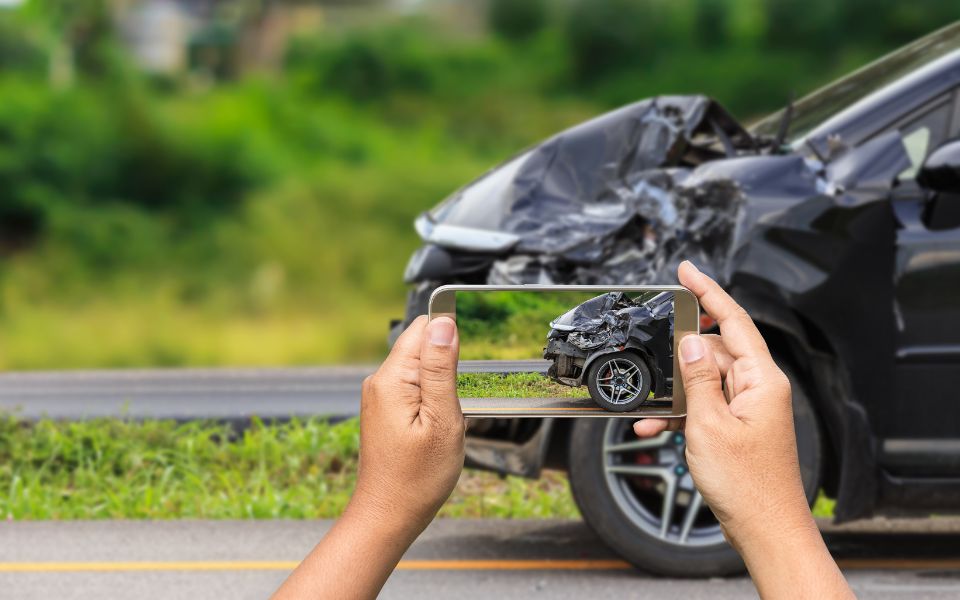The aftermath of a car accident can be treacherous. Each decision made, from the moment of impact to the final settlement, carries the weight of potential consequences on your legal rights and financial recovery. It’s a path lined with pitfalls that, if not carefully avoided, can significantly undermine your case and compromise your ability to secure fair compensation. Unfortunately, many victims unwittingly fall into these traps due to a lack of information or guidance during this critical time.
Understanding the common mistakes people make after a car accident is not just about steering clear of pitfalls; it’s about empowering yourself to take the right steps that protect your interests. Whether it’s failing to document the scene adequately, admitting fault prematurely, or mishandling communications with insurance companies, each misstep can have a domino effect, complicating your path to justice and recovery.
1. Failing to Call the Police or Report the Accident
In the chaos following a car accident, it might seem tempting to settle matters privately, especially if the damage appears minor. However, this decision can significantly impact the outcome of your case. Calling the police to the scene and ensuring an official report is filed serves as a foundational element of your legal protection and claim process.
The Importance of an Official Report
An official police report provides an unbiased account of the accident, detailing the circumstances, involved parties, and, in many cases, an initial assessment of fault. This document is crucial for several reasons:
- Legal Requirement: In many jurisdictions, the law mandates the reporting of accidents involving significant damage, injuries, or fatalities. Failure to comply can result in legal penalties.
- Insurance Claims: Insurance companies often require a police report to process claims. The report’s details help insurers determine liability and coverage, serving as a key piece of evidence in your favor.
- Establishing Facts: As time passes, memories can fade, and accounts of the accident may vary. The police report serves as a contemporaneous record, establishing a baseline of facts that can support your case.
Consequences of Not Reporting
Choosing not to report an accident can lead to several adverse outcomes:
- Disputed Claims: Without a police report, it becomes easier for the other party or insurance companies to dispute your account of the accident, potentially denying your claim.
- Legal Vulnerabilities: If injuries or damages surface after the fact, lacking a report complicates legal action or insurance claims, often to the detriment of the unreported party.
- Insurance Rate Implications: Insurers may view the absence of a report skeptically, affecting policy renewals or rates, irrespective of fault.
In essence, while it might seem convenient or faster to bypass formalities, the failure to call the police and file an accident report can significantly undermine your legal standing and financial recovery. Always err on the side of caution and legality to protect your rights and interests from the outset.
2. Not Seeking Immediate Medical Attention
The adrenaline rush in the immediate aftermath of a car accident can mask pain, leading many individuals to mistakenly believe they are uninjured. This misperception can lead to one of the most detrimental mistakes in the context of a car accident case: failing to seek immediate medical attention.
Immediate Medical Evaluation is Crucial
Even if you feel fine, it’s imperative to undergo a medical evaluation as soon as possible after an accident. Here’s why:
- Hidden Injuries: Some injuries, such as whiplash, concussions, or internal bleeding, may not present symptoms immediately. Early diagnosis and treatment are vital for your health and recovery.
- Medical Records as Evidence: Seeking prompt medical attention provides a documented link between the accident and your injuries. This documentation is crucial when filing insurance claims or pursuing legal action, as it serves as evidence that the injuries were a direct result of the accident.
The Impact of Delayed Medical Care
Neglecting to seek medical care promptly can have significant repercussions:
- Questioning of Claim Legitimacy: Insurance companies may question the severity of your injuries or argue that they were not related to the accident if there’s a significant gap between the incident and seeking medical care.
- Compromised Health Outcomes: Delaying treatment can lead to complications or prolonged recovery times, affecting your overall health and well-being.
- Reduced Compensation: The extent of your injuries and the immediacy of your medical response play a critical role in the valuation of your claim. Delays can be misconstrued as an indication that your injuries were not serious, potentially reducing the compensation you might otherwise be entitled to.
Take Action for Your Health and Your Case
Your health should be your top priority following a car accident. By seeking immediate medical attention, you not only ensure that any hidden injuries are identified and treated but also solidify the foundation of your legal case. Check out our guide on Everything You Need to Do (And Not Do) After a Car Accident.

3. Admitting Fault at the Scene
In the immediate aftermath of a car accident, emotions run high, and the urge to apologize or admit fault can be overwhelming. However, such admissions can have far-reaching consequences on the outcome of your case.
Why You Should Avoid Admitting Fault
- Premature Judgments: At the scene of an accident, it’s often difficult to have a full understanding of all the factors that contributed to the incident. Admitting fault before a thorough investigation can unjustly place the blame on you, regardless of the actual circumstances.
- Insurance Implications: Your statements at the accident scene can be used by insurance companies to determine liability. Admitting fault can lead to a denial of coverage for your damages and injuries, as well as increased premiums.
- Legal Consequences: If your case goes to court, statements made at the scene admitting fault can be used against you, potentially compromising your ability to recover damages.
The Importance of Remaining Neutral
- Stick to the Facts: When discussing the accident with police, other drivers, or witnesses, focus on factual information without inserting opinions or admissions of guilt.
- Allow Investigations to Determine Fault: Fault is a complex determination that takes into account traffic laws, witness statements, and physical evidence. It’s best left to professionals who can objectively analyze the situation.
- Consult with a Lawyer: Before making any statements that could be interpreted as admitting fault, it’s crucial to consult with a car accident lawyer. They can advise you on how to communicate about the accident in a way that protects your interests.
Navigating Post-Accident Conversations
Understanding the importance of your words following a car accident cannot be overstated. While it’s natural to express concern for all parties involved, ensure that your compassion doesn’t translate into an unwarranted admission of responsibility. It’s possible to be empathetic without compromising your legal standing.
4. Not Gathering Evidence at the Scene
Collecting evidence on the scene of your accident is vital for supporting your case. Failing to gather this evidence can significantly weaken your position in both insurance claims and legal proceedings.
The Value of Comprehensive Evidence
- Photographic Documentation: Take photos and videos of the vehicles involved from various angles, capturing the damage, position of cars, traffic signs, and road conditions. These images serve as irrefutable evidence of the accident’s context and impact.
- Witness Information: Collect names, contact information, and statements from witnesses. Independent accounts of the accident can corroborate your version of events and provide additional perspectives that support your case.
- Personal Records: Write down your own recollection of the accident as soon as possible. Over time, memories can fade or become less accurate, so documenting your immediate thoughts and observations is invaluable.
Consequences of Insufficient Evidence
- Disputes Over Fault: Without clear evidence, it becomes easier for the other party or insurance companies to contest your account of the accident, potentially blaming you for the collision.
- Challenges in Claiming Damages: Detailed evidence is crucial for substantiating the extent of damages and injuries sustained. Insufficient documentation can lead to reduced compensation or outright denial of your claim.
- Legal Hurdles: In the event of a lawsuit, the absence of solid evidence can severely limit your attorney’s ability to argue your case effectively, impacting the settlement or judgment in your favor.
Tips for Effective Evidence Collection
- Be Thorough: Even if something seems insignificant, document it. Small details can sometimes play a pivotal role in determining fault and liability.
- Use Technology: Utilize your smartphone for taking photos and videos, recording witness statements, and noting your personal recollections.
- Stay Organized: Keep all collected evidence organized and accessible. Proper documentation can expedite the claim process and enhance your legal representation’s efficiency.

5. Giving a Recorded Statement to Insurance Companies
After a car accident, it’s typical for insurance companies to contact those involved, seeking a recorded statement to gain insight into the event. While this may seem like a standard procedure, providing such a statement without legal advice can inadvertently harm your case.
The Risks of Recorded Statements
- Misinterpretation: Insurance adjusters are trained to analyze statements in ways that could minimize their liability. Innocent remarks can be taken out of context or used to imply fault where it may not entirely lie with you.
- Premature Information: In the immediate aftermath of an accident, the full extent of injuries or damages may not be apparent. Statements made before a complete understanding of your injuries can lead to underestimating your claim’s value.
- Pressure Tactics: Adjusters may attempt to elicit responses that weaken your position or suggest that you don’t need legal representation, undermining your ability to negotiate a fair settlement.
Why Legal Counsel is Essential
- Protection: A car accident attorney can guide you on what information should be shared and what to withhold, protecting you from providing statements that could be used against your claim.
- Contingency fees: Car accident lawyers often operate with a contingency fee. Meaning you don’t pay a dime unless they win your case. This means they have all the incentives to get you maximum compensation for your case.
- Experience: Experienced car accident lawyers are familiar with the tactics used by insurance companies and can navigate these interactions effectively, preventing common pitfalls.
Navigating Insurance Communications
- Direct Insurers to Your Car Accident Attorney: Inform your insurance company that all communications should go through your car accident lawyer. This step ensures that your legal rights are maintained and that you’re not pressured into making harmful statements or accepting inadequate settlements.
- Understand Your Rights: You’re not obligated to provide a recorded statement to the other party’s insurance company. Consult with your car accident lawyer before engaging in any discussions or negotiations.
- Stay Informed: Your car accident attorney can keep you apprised of what is necessary for your case, including when and how to safely communicate with insurers.
6. Accepting the First Settlement Offer
In the aftermath of a car accident, facing mounting medical bills and potential loss of income can lead individuals to consider accepting the first settlement offer from an insurance company. However, this initial offer is often far less than what is truly needed to cover all damages and future implications of the accident.
Understanding Insurance Company Tactics
- Quick Settlements: Insurance companies may offer a quick settlement to close the case as economically as possible. These offers are typically made before the full extent of your injuries and damages can be realized, potentially leaving you with insufficient funds to cover long-term needs.
- Underestimation of Damages: The first offer rarely reflects the true value of your claim, including medical expenses, lost wages, pain and suffering, and future rehabilitation costs.
The Importance of a Thorough Evaluation
- Comprehensive Assessment: Before accepting any offer, it’s crucial to have a complete understanding of your current and future medical needs, the impact on your ability to work, and the overall effect on your quality of life.
- Legal Representation: A car accident lawyer can provide a valuation of your claim based on experience with similar cases, ensuring that any settlement offer adequately compensates for your losses and future needs.
Strategies for Negotiation
- Counteroffers: With legal assistance, you can make informed counteroffers that more accurately reflect the compensation you deserve.
- Patience is Key: It’s important to resist the urge to settle quickly, especially if you have not yet fully recovered or if the future impact of your injuries is uncertain.
- Professional Advocacy: An experienced attorney can negotiate on your behalf, using evidence and expert testimony to strengthen your position and achieve a fair settlement.
Rejecting Inadequate Offers
- Right to Refuse: Remember, you are under no obligation to accept the first or any inadequate settlement offer. With legal guidance, you can make informed decisions about when to accept an offer or when to proceed to litigation if necessary.
Accepting the first settlement offer without considering the full scope of your damages and future needs can result in financial difficulties down the line. It’s essential to consult with a car accident lawyer who can evaluate the offer, negotiate with the insurance company, and ensure that you receive the compensation you rightfully deserve.

7. Overlooking Future Damages
One of the most significant oversights in the aftermath of a car accident is failing to account for future damages. The immediate financial strain of medical bills and lost wages can overshadow the long-term implications of injuries, leading to settlements that fall short of covering all future needs.
The Scope of Future Damages
- Long-Term Medical Care: Injuries sustained in car accidents can require ongoing medical treatments, surgeries, rehabilitation, and therapy.
- Lost Earning Capacity: Serious injuries may impact your ability to work, either temporarily or permanently, reducing your future earning potential.
- Pain and Suffering: The non-economic impacts, such as chronic pain, emotional distress, and decreased quality of life, deserve compensation as well.
Assessing the Full Impact
- Expert Consultation: It’s often necessary to consult with medical professionals, occupational therapists, and economists to accurately project the long-term impacts of your injuries.
- Comprehensive Valuation: A detailed assessment ensures that all future costs are considered, from medical expenses to adjustments required for daily living and employment.
Legal Representation Matters
- Advocacy for Your Future: An experienced car accident lawyer plays a crucial role in forecasting and advocating for compensation that covers future damages. They understand how to present evidence and expert testimony to support the need for a comprehensive settlement.
- Negotiating for Fairness: Insurance companies often resist acknowledging the full extent of future damages. A lawyer can effectively argue for a settlement that truly reflects your long-term needs and losses.
The Risk of Settling Without Considering Future Damages
- Financial Shortfalls: Accepting a settlement without accounting for future damages can lead to financial difficulties as ongoing expenses outpace the compensation received.
- Irrevocable Decisions: Once a settlement is agreed upon and signed, you typically cannot go back and ask for more money if future complications arise. It’s imperative to get it right the first time.
Overlooking future damages in your claim can have lasting consequences, underscoring the importance of a thorough evaluation of all potential long-term impacts. Ensuring that your settlement accounts for these damages is essential for securing your financial and emotional recovery.
8. Posting About the Accident on Social Media
Sharing details of your accident on social media can unintentionally harm your case. Insurance adjusters and opposing attorneys may scrutinize your online activity, seeking evidence to dispute the severity of your injuries or the impact on your life.
Why Caution is Crucial
- Potential Evidence: Innocuous posts can be misconstrued, suggesting you’re less injured than claimed.
- Privacy Illusions: Even with strict privacy settings, your information might not be as secure as you think.
Social Media Guidelines
- Minimize Activity: Consider reducing your online footprint until your case resolves.
- No Accident Details: Avoid discussing any aspects of the accident, your injuries, or legal proceedings.
Social media posts can be used against you in both negotiations and court. Limiting your activity and consulting with your lawyer before posting can help safeguard your claim.
9. Not Consulting a Car Accident Lawyer
Many individuals underestimate the complexity of car accident claims, believing they can navigate the process alone. However, failing to seek professional legal advice can significantly disadvantage your case.
The Value of Expert Legal Guidance
- Navigating Complexities: Car accident cases can involve intricate legal and procedural nuances. An experienced lawyer can navigate these complexities, ensuring your case is handled correctly.
- Maximizing Compensation: Lawyers are skilled in evaluating the full extent of your damages, including those you might not have considered, such as emotional distress or future medical expenses. They work to ensure you receive fair compensation.
- Negotiating with Insurance Companies: Insurance adjusters aim to minimize payouts. A lawyer can advocate on your behalf, countering lowball offers and negotiating for a settlement that reflects the true value of your claim.
- Legal Strategy: Should your case go to court, a lawyer can develop a strong legal strategy, gather necessary evidence, and represent your interests effectively.
Risks of Going It Alone
- Underestimating Damages: Without legal expertise, you might not fully understand the value of your claim, leading to acceptance of inadequate settlements.
- Procedural Missteps: The legal process is fraught with deadlines and procedural requirements. Missing a deadline or failing to file certain documents can jeopardize your case.
- Settlement Negotiation Disadvantages: Negotiating without legal representation can put you at a significant disadvantage, as you may not possess the negotiation skills and legal knowledge that an experienced lawyer does.
Making the Right Decision
Choosing not to consult with a car accident lawyer can be a critical mistake, potentially resulting in a settlement that doesn’t cover all your needs or, worse, losing your right to compensation altogether. Legal representation not only levels the playing field but also provides peace of mind, allowing you to focus on recovery while your attorney handles the legalities.
The decision to consult with a car accident lawyer is fundamental to protecting your rights and securing the compensation you deserve. Their expertise and advocacy can significantly impact the outcome of your case.

10. Missing Deadlines for Filing Claims
Missing the statute of limitations for filing a car accident claim is a critical error, leading to the permanent loss of the right to seek compensation. These deadlines vary by state and claim type, emphasizing the need for prompt action.
Key Points
- Irreversible Consequences: Failing to file within the legal timeframe means losing the ability to sue, regardless of the claim’s validity.
- State-Specific Deadlines: It’s vital to know the deadlines applicable in your state to avoid unintentionally forfeiting your rights.
- Early Legal Consultation: Consulting with a car accident lawyer soon after your accident ensures you understand these deadlines and can prepare your case accordingly.
Proactive Approach
- Immediate Action: Engage a lawyer quickly to navigate the legal system effectively and secure your right to compensation.
- Documentation: Maintain comprehensive records to support your case and facilitate timely legal action.
Conclusion
Navigating a car accident case is fraught with potential missteps, from failing to document the accident properly to overlooking the long-term impacts of injuries. Each decision made in the aftermath plays a crucial role in determining the success of your claim and the extent of your financial recovery.
Essential Takeaways
- Immediate Actions Matter: Quick, informed decisions post-accident protect your interests.
- Documentation is Key: Comprehensive evidence collection strengthens your case.
- Legal Deadlines are Critical: Adhering to filing deadlines is non-negotiable for preserving your rights.
- Professional Guidance is Paramount: Consulting with a car accident lawyer ensures your actions are aligned with your best interests, maximizing your compensation potential.
The Role of Expert Legal Assistance
Securing experienced legal representation early can prevent common pitfalls and significantly impact the outcome of your case. A lawyer’s expertise not only guides you through the legal maze but also advocates for your rightful compensation.
Act Now
If you’re dealing with the aftermath of a car accident, the time to act is now. Avoiding the mistakes outlined here begins with seeking expert advice. At TorkLaw, our dedicated team is ready to support you every step of the way. Contact us to ensure your case is handled with the care and expertise it deserves.



